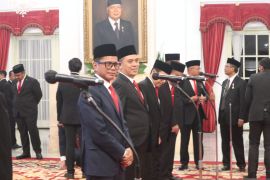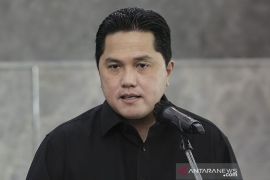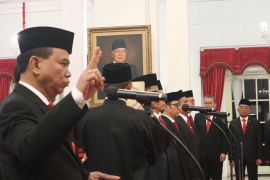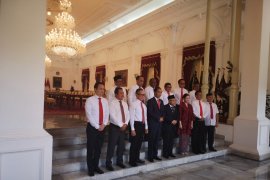"The presidential regulation was signed by the President yesterday and would be made known to the public soon," said presidential spokesman Julian A Pasha, who was accompanying the President on a visit to Ambon, Maluku, on Friday.
In its ruling, the Supreme Court pointed out that Article 10 of Law Number 39 of 2008 was inconsistent with the Constitution. Several parties had previously filed a lawsuit in the Supreme Court, stating the selection process of deputy ministers was unconstitutional.
The Supreme Court ruled the president did not violate the constitution when he appointed the deputy ministers. However, the court requested the president to review his regulation in order to bring it in line with the court`s ruling.
The new presidential regulation number 60 of 2012 has replaced three previous regulations - number 47 of 2009, number 76 of 2011, and number 92 of 2011.
The new regulation states deputy ministers report to ministers and assist them in implementation of ministerial duties, according the cabinet secretary`s official website.
The tasks include assisting ministers in: the decision-making process; the implementation of working programs and contracts; giving recommendations and advice regarding the implementation of ministerial tasks and functions; controlling and monitoring the implementation of ministerial tasks and functions; and assessing and determining officials in ministries.
Deputy ministers are appointed and dismissed by the President. Their term of office is same as that of the President`s, or ends when the President ends his tenure, according to the new regulation.
Regarding the deputy ministers, financial rights and other perks, the regulation states they are less than those of ministers but more than those of echelon IA officials. The finance minister is yet to unveil the exact figures.
According to Article 6 of the regulation, both civil servants and non-civil servants can become deputy ministers. Civil servants who are appointed as deputy ministers will be suspended as civil servants during their tenure and would be reinstated after the tenure is over.
During their tenure as deputy ministers, retired civil servants would not get a pension.
While carrying out their duties, the deputy ministers will be assisted by the secretariat general, directorate general, deputies, inspectorate general, and other agencies under their respective ministries. (*)
Editor: Aditia Maruli Radja
Copyright © ANTARA 2012











